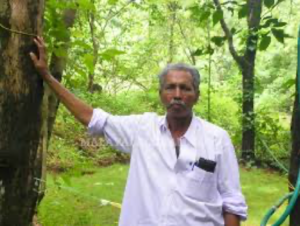
Abdul Kareem
A mad idea?
The story began in Kasargode District, Kerala, India, in the early 1970s. Abdul Kareem spent his savings for a piece of wasteland on a rocky laterite hill. The barren region had hardly ever seen water and was barely habitable. His family and friends thought he was out of his mind. Worse was to come. Kareem started boring deep holes into the hard rock to plant saplings.
Kareem had been running a travel and placement service in Nileswar for Keralites eager to go to the Gulf for employment. His wife came from the village of Puliyamkulam, about 20 km away. While visiting Puliyamkulam, he came by this hill. “I would walk around the area and see barren hill sides,” he says. “It was a heartache of a sight and the pull on me was strong. I suddenly realised that I had often dreamt of the Kaavus of India’s collective memory. They were the sacred groves that every village had once upon a time. I had been told of them as a child and I think I had subconsciously yearned for one.”
A forest grows
On an impulse he bought two hectares of barren rock with a pathetic well and started planting trees. He cycled great distances just to fetch some precious water for his little plants. Yet none of them survived the first year. Kareem, however, would not give up. He started planting the saplings all over again. Then one day, during the third year, a miracle happened. A defiant sapling burst through the scorched surface. Encouraged, he began planting even more. And slowly, nature began to relent and the trees began to multiply. Kareem faced many challenges: At one stage, a forest fire burnt down everything that he had planted. But he never gave up and continued doing what he what wanted to do – planting saplings.
When the trees started growing, the water level in the well rose. Kareem had meanwhile bought more land, ending up with 25 hectares. He now began to plant the whole area in a frenzy. He chose a variety of plants plucked from the wild and let nature do the rest. Kareem has never weeded his land, never lopped a tree, never swept the leaves, never hunted game, never selected a particular species and, of course, never used chemicals of any kind.
Birds began to arrive and disseminate all types of seeds. Weeds grew and amidst them rare herbs and medicinal plants – none chosen by Kareem. Water levels in villages within a 10 km radius rose. The once barren hill became a forest and a water sponge.
Biodiversity blooms
Kareem now lives in a house in his forest, which is home to more than 800 plant species, 300 medicinal plants, thousands of species of birds and insects as well as mammals, very much like a naturally occurring forest. It attracts researchers, students, and environmentalists from across the world. Kareem allows his neighbours to draw water from the wells and ponds in the forest free of cost. Kareem has so far resisted offers to convert the forest into a holiday resort.
“Deep inside every one of us is a call to the wild,” he says. “Much of the impatience, discontent, or violence around us is due to a lack of opportunity to reconnect with where we came from. For sanity and generosity of spirit, we should be able to witness nature at its unceasing, rejuvenating work.” What did he get out of the long years of toil? “My rewards are the highly mineralised, herbalised water, the fragrant air, the daily walks through the woods, a healthy life, and an enormous peace,” he says.
All over the world, there are many Abdul Kareems, quietly planting trees. I will post other such stories later.

Unless stories like this are forcefully included in the curriculum, we may not see the younger generation realising the values in connecting with nature. Also, we have become so commercial, both in our minds and action, that such efforts are not supported until results are seen. If ever Abdul Kareem had failed, this would surely have become an example of what people should not do and they would have continued to call him mad. Even after seeing him successful, people will dare not repeat the attempt, except for the few who look at life differently, as no one is interested in a life full of hardships. Neither the parents nor the society have the patience or the tolerance to provide enough space to the younger generation unless children literally revolt because of a passionate pursuit.
Hi Ravi, The story of Abdul Kareem is included in the text books at Kasargod and due to this he has many visits from children 🙂
Thanks for the info. But this has to travel beyond Kasargod, not just this but many things like this, so that it becomes part of everyone’s approach to life even in desolate areas.